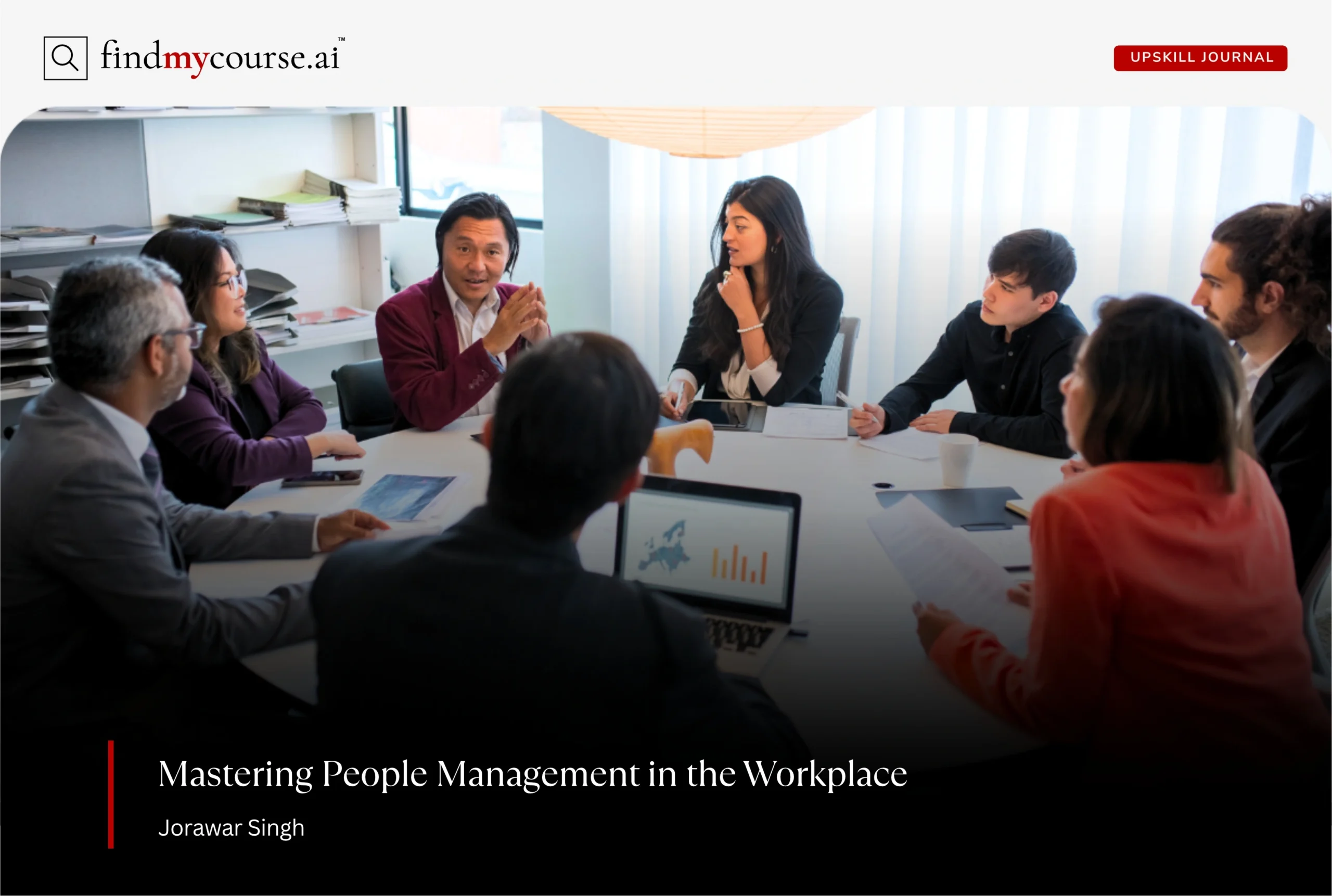Being a people manager is more than just overseeing a team—it’s about leading with purpose, empathy, and clarity. People management plays a central role in team success, job satisfaction, and long-term business growth. Yet many managers are promoted without proper training, leaving them unsure of how to truly connect with and support their team.
Whether you’re a new manager or learning to improve, mastering people management is one of the most valuable investments you can make. In this guide, we’ll walk through the core concepts, essential skills, and practical steps to help you grow into a better people manager.
What is People Management—and Why It’s the Heart of Workplace Success
People management refers to how you guide, support, and lead individuals within a team or organization. It includes everything from communication and goal setting to feedback, performance management, and professional development. At its heart, people management is about creating an environment where your team can do their best work. When done well, it leads to higher engagement, better retention, improved collaboration, and stronger results—especially since managers account for 70% of a team’s engagement, according to Gallup’s 2024 Global Workplace report.
In today’s fast-changing work environment—especially with hybrid and remote models—effective people management has become even more important. Employees want managers who listen, understand their challenges, and help them grow. A great people manager can inspire loyalty, while a poor one can drive top talent away.
Essential Skills Required for Effective People Management
To be an effective people manager, you’ll need more than technical knowledge. Soft skills are the foundation of successful leadership. Here are a few key areas to focus on:
- Communication
Clear, honest communication is at the heart of great people management. Whether you’re giving feedback, assigning tasks, or checking in, aim to be direct, respectful, and easy to understand. Encourage open dialogue and listen just as much as you speak. Tools like Slack can support ongoing team conversations, but it’s your clarity and consistency that truly build trust.
- Empathy
Understanding how your team feels and what they’re going through allows you to respond with care. Empathy helps you support people in tough situations and build deeper relationships.
- Feedback and Recognition
Great people managers give feedback regularly—not just during performance reviews. Be specific when recognizing good work, and offer constructive input in a way that supports growth. Let your team know you see their efforts and care about their progress. A tool like Officevibe can help gather honest feedback and track team sentiment.
- Adaptability
Workplaces change quickly. Being flexible and helping your team adapt to new priorities or tools is essential for success.
- Conflict Resolution
Disagreements are natural, but it’s how you handle them that matters. A calm, fair approach can help resolve issues before they grow into bigger problems.
- Delegation
Trust your team with responsibilities. Delegating shows confidence in their abilities and gives them space to grow.
Developing these skills takes time, practice, and the right guidance. Consider formal training like People Managers Specialization(Coursera) to build a strong, practical foundation in communication and people management.
Proven People Management Strategies That Actually Work
To apply your skills in real situations, try using the strategies below:
- Set Clear Expectations
Be clear about goals, roles, and deadlines so your team knows exactly what’s expected. When direction is solid, energy flows where it should. Tools like Trello can help keep tasks organized and visible without overcomplicating things.
- Hold Regular One-on-Ones
Consistent one-on-one meetings are one of the most powerful habits a people manager can build. They create space for honest conversations and help uncover issues before they grow. Use this time to listen, offer support, and talk about goals. Using a tool like Google Calendar makes it easy to schedule these important check-ins.
- Create a Culture of Growth
Support learning and development. Encourage your team to take courses, join projects, or even study online using platforms like Coursera or LinkedIn Learning. Moreover, helping them grow shows you care and encourages long-term engagement.
- Encourage Ownership
Encouraging team members to take the lead and make decisions builds confidence, accountability, and trust. When people feel both empowered and connected to their team, engagement soars. According to ADP Research, employees with autonomy and a strong sense of team are 2–5 times more likely to be fully engaged—with 52% engagement in high-performing teams compared to just 10% in others..
- Be Available and Approachable
Your team should feel they can reach out without hesitation. Being approachable means creating an atmosphere of openness and trust—whether it’s a quick question or a deeper concern. Additionally, keep your availability visible with Calendly, and respond with patience and presence.
- Use Simple Tools for Communication and Tracking
Staying connected and organized doesn’t have to be complicated. Simple tools like Notion can help you manage tasks, share updates, and keep communication flowing—all in one place. Choose what fits your team, and keep it consistent.
How to Lead Remote and Hybrid Teams Effectively
Managing people across different locations brings unique challenges—especially in communication, connection, and visibility. As a people manager, your role is to ensure every team member feels supported, included, and aligned, regardless of where they work. To lead effectively in a hybrid or remote setting:
- Communicate intentionally: Don’t rely on informal chats. Schedule regular virtual one-on-ones and team meetings to maintain alignment, build trust, and offer space for feedback and support.
- Support asynchronous communication: Encourage communication that doesn’t require immediate replies. This allows for greater flexibility, supports deep focus, and accommodates different time zones.
- Make goals and progress visible: Transparency becomes even more important when teams aren’t co-located. Ensure everyone is clear on priorities, responsibilities, and progress.
- Foster genuine team connection: Celebrate milestones, acknowledge contributions, and create space for informal interactions. A strong sense of belonging can exist regardless of location.
- Respect personal boundaries: Encourage breaks, clarify working hours, and be mindful of time zones. Promote flexibility while helping your team maintain work-life balance.
Leading remote teams means creating an environment where people feel connected, supported, and aligned. Tool like Asana make it easier to maintain clear communication and shared focus, no matter where everyone works.
Common People Management Mistakes—and How to Avoid Them
Even the best people managers make mistakes. But being aware of common pitfalls can help you avoid them.
- Micromanaging
Hovering over your team’s every move can lead to stress and low morale. Instead, trust your team and check in at key points. - Ignoring Feedback
If your team offers suggestions or voices concerns, don’t brush them off. Listening and taking action builds trust. - Playing Favorites
Be fair in how you assign tasks, give recognition, and handle issues. Unequal treatment can quickly damage team culture. - Avoiding Difficult Conversations
Tough topics—like performance issues or conflicts—shouldn’t be avoided. Handle them directly but respectfully. - Focusing Only on Results
Of course, performance matters. But if you ignore well-being, motivation, or morale, results will eventually suffer too.
If you’ve made some of these mistakes, you’re not alone—and the right training can make all the difference. Courses like Becoming a People Manager” from Indiana University on edX offer real-world tools to lead with clarity, fairness, and confidence.
Conclusion
Great people management is built on empathy, clarity, and continuous learning. You don’t need to be perfect—you just need to be present, listen well, and lead with intention. Start today by scheduling a one-on-one, giving thoughtful feedback, or learning a new skill. Small actions build trust and create a culture where your team can thrive. Keep showing up—your growth is your team’s gain. And when challenges come up—or you just need a second opinion—don’t hesitate to ask our AI assistant.


